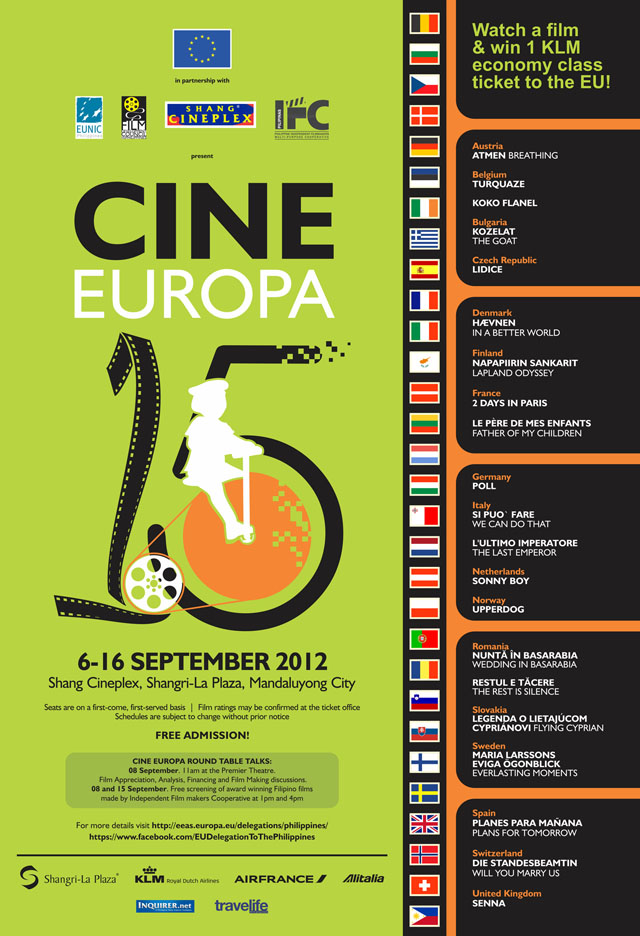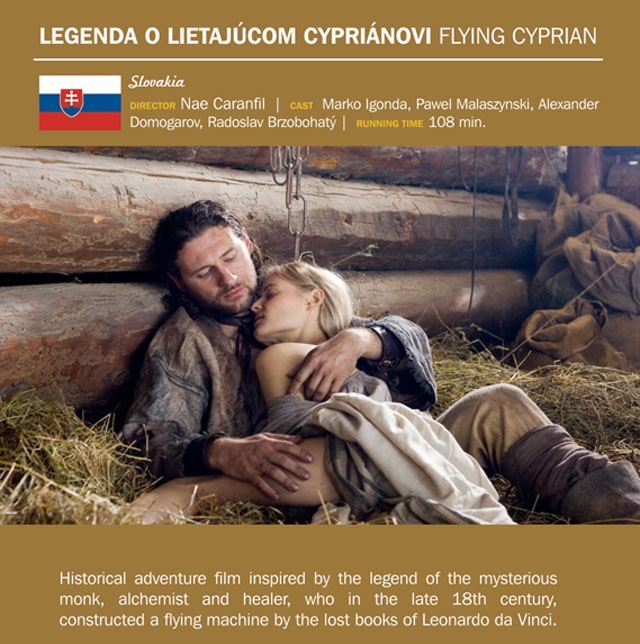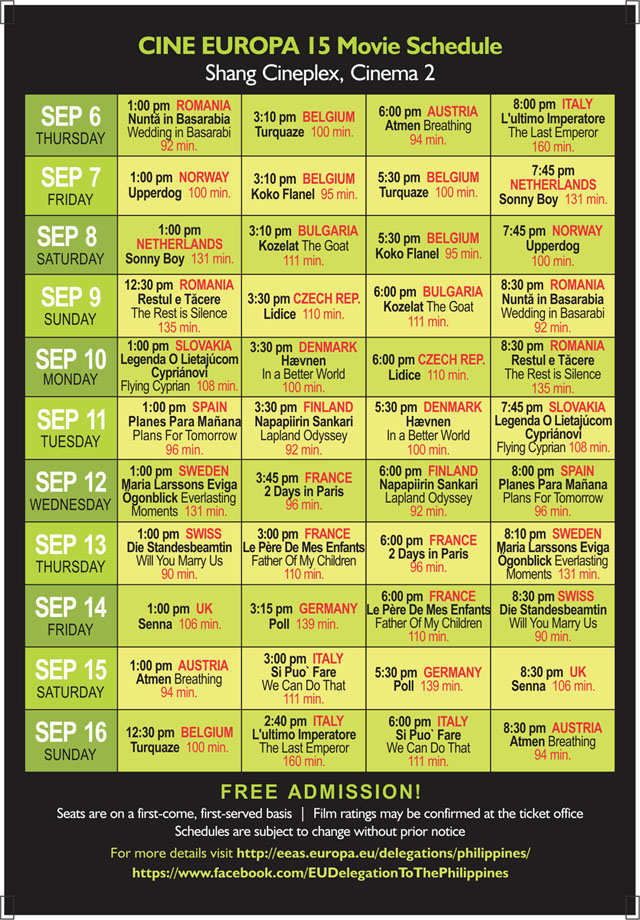Filtered By: Lifestyle
Lifestyle
15th Cine Europa 2012 to show PHL films, docu
By IBARRA C. MATEO
The 15th edition of the Cine Europa, running from Sept. 6 to Oct. 21 in six Philippine cities, will showcase for the first time three Philippine films and one documentary with “European connections” to further promote better understanding between Europeans and Filipinos. 

Julian Vassallo, European Union Delegation to the Philippines political counselor, said on top of the 21 films from European countries, the 2012 Cine Europa will screen on Sept. 8 Clodualdo del Mundo, Jr.’s “Paglipad ng Anghel” and the documentary “Kano.” On Sept. 15, meanwhile, the films “Bakal Boys” and “MNL 143” will be shown.
“We are for the first time screening four Filipino films that have been chosen either for their links to Europe or the awards and acclamation they received there. I believe that the screening of the Filipino movies will also help us get to know each other better,” Vassallo said.
Vassallo told a news conference that “’Bakal Boys’ is considered as the most awarded Filipino film in 2009, winning awards in Thessaloniki, Greece, in Torino, Italy, and in Barcelona, Spain.”
He also announced two other major innovations in this year’s Cine Europa “that should consolidate further the Festival's place in the local cultural calendar.” These changes are: the increase in venues from three (Manila, Cebu, and Cagayan de Oro) to six (expanding to Davao, Baguio, and Iloilo) to reach a wider Filipino audience, and the new educational component of film festival.
“We are boosting the educational component of Cine Europa to make it not only an opportunity to watch European movies, but also to learn about movie-making itself with some of the best local talents … Our new partner, the Independent Film Cooperative, is assisting us to bolster the educational component through the organization of educational round tables with prominent film personalities and experts to explore the links between European and Filipino films as well as facilitating the presentation of Filipino movies with European connections,” he said.
Vassallo thanked one of its partners, the Film Development Council of the Philippines (FDCP), for agreeing to host Cine Europa in three of its cinematheques in Davao, Baguio, and Iloilo that will enable an even bigger number of Filipinos to watch the Cine Europa films. “The Filipino public is after all what Cine Europa is first and foremost about,” he said.
With only 11 European films participating when the first Cine Europa was rolled out in 1998, the film festival has grown, with 21 European films to be screened this year.
“In the last 15 years, the festival has brought European quality films to more than 200,000 film enthusiasts. Last year alone, we reached 24,000, and hope to make another leap in viewers in 2012,” he said.
The 17 countries participating in the 2012 Cine Europa are:
- Austria (“Atmen”);
- Belgium (“Turquaze” and “Koko Flanel”);
- Bulgaria (“Kozelat”);
- Czech Republic (“Lidice”);
- Denmark (“Haevnen”);
- Finland (“Napapiirin Sankarit”);
- France (“Two Days in Paris” and “Le Pere de Mes Enfants”);
- Germany (“Poll”);
- Italy (“Si Puo Fare” and “L’Ultimo Imperatore”);
- The Netherlands (“Sonny Boy”);
- Norway (“Upperdog”);
- Romania (“Nunta in Basarabia” and “Restul e Tacere”);
- Slovakia (“Legenda o Lietajucom Cyprianovi”);
- Spain (“Planes para Manana”);
- Sweden (“Maria Larssons Eviga Ogonblick”);
- Switzerland (“Die Standesbeamtin”); and
- United Kingdom (“Senna”).

Films without borders
In the same press conference, Benedict Salazar Olgado, director of the FDCP’s National Film Archive of the Philippines, said for the last 15 years, Cine Europa is bringing the very best of European cinema to the Filipino people.”
“Through FDCP’s Film Cultural Exchange Program, we continue to bridge nations and people through the power of cinema. Cine Europa, in partnership with this program, engages us with faces and voices, stories and sensibilities that are strange and familiar at the same time,” Olgado said.
“We marvel at lives in a distant shore while also finding comfort in our commonality. This connection is what makes Cine Europa successful year after year. Filipinos find affinity with immigrants in Belgium, lovers in Paris, and urbanites in Spain. Despite the distance and the barriers, these films without borders run deep within our common and shared humanity,” he said.
“Without a doubt, Cine Europa is in every Filipino cinephile’s annual calendar. And through FDCP’s Cinematheque Program we’re bringing these films to more Filipinos nationwide,” Olgado said.
“As you have probably noticed by now, European cinema is less known for sugary movies with happy endings than for films that find the absurd, the humorous, and the ironic in our daily lives, or that shine a torch on forgotten pockets of our societies. Our selection this year will take you from juvenile prison cells to the Chinese imperial palace; from youthful misbehavior in the land of Father Christmas to drama in an African refugee camp,” Vassallo said.
“You can share in the trials of mixed-race couples or in the love-life of a tramp. Watch as a flying machine is constructed from the plans of Leonardo Da Vinci or see the world through the eyes of a goat. Witness the madness of war and the genius of the slightly-mad. Cine Europa allows us, Europeans, to show you what makes us laugh, what makes us cry, and what makes us tick. We hope that cinema will do its magic and help us get to know each other a little better,” he added.
To honor Norway as the latest addition to the Cine Europa in the Philippines participant, the Norwegian Film “Upperdog” opens the film festival on Sept. 5 at the Shangri-La Plaza Cineplex, where the Manila String Quartet performs and an exhibition by local artists will be also launched.
The “Upperdog” tackles multiculturalism from the experiences of two young Koreans adopted by two different families from Oslo. Directed by Sarah Johnsen, “Upperdog” received various “Amanda” awards, the equivalent of Oscar awards in Norway.
In Cebu, the festival opens with the Italian movie by Bernardo Bertolucci, the “L’Ultimo Imperatore” (The Last Emperor).
After Opening Night, all film showings of the Cine Europa will be opened to the public free of charge in the following venues:
- Shangri-La Plaza (Sept. 6-16)
- Ayala Center in Cebu (Sept 21-24)
- Liceo de Cagayan in Cagayan de Oro ( Sept. 27-30)
- FDCP Cinemateque-Davao (Oct. 4-7)
- FDCP Cinemateque-Baguio (Oct. 11-14)
- FDCP Cinemateque- Iloilo (Oct. 18-21).

–KG, GMA News
For more details, visit: http://www.eeas.europa.eu/delegations/philippines and www.shangrila-plaza.com.
All photos courtesy of the EU Delegation to the Philippines
More Videos
Most Popular




